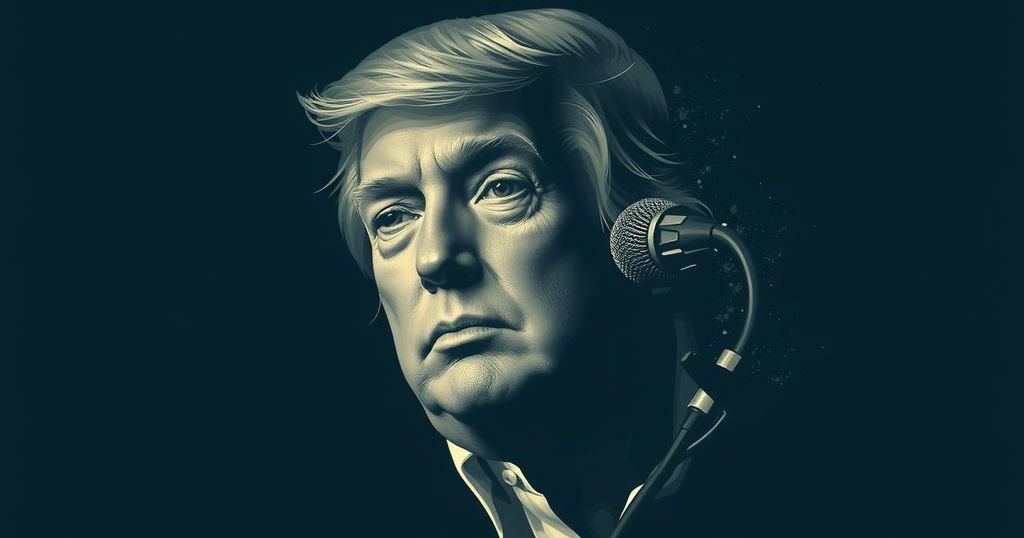Anxiety Over Democracy and Dictatorship Amidst the 2024 Election
The article expresses deep anxiety over the potential of a Donald Trump presidency, reflecting on historical lessons regarding dictatorship, systemic inequalities, and the fragility of democracy. Personal experiences of stress exemplify the broader emotional turmoil associated with the upcoming 2024 election, emphasizing the need for vigilance in the face of authoritarian tendencies. The author warns against the escalating divisions within society and the challenges confronting democratic principles.
The prospect of a Donald Trump presidency looms ominously, instilling profound anxiety among many citizens. The prelude to the 2024 presidential election has fostered a climate of fear and uncertainty, as personal health issues stemming from stress have become evident. Conversations among colleagues reflect the heightened emotional state akin to waiting for the outcome of a critical situation, with the survival of democracy hanging in the balance. This anxiety is not unfounded; it arises amidst the recognition of systemic inequalities and the fragile nature of democracy. The stark contrast between wealth and poverty, along with the influence of oligarchs in political decisions, obscures any idealistic notions of equality in governance. Despite the apparent flaws, the alternative—a dictatorship—presents a significantly graver threat that could jeopardize the very fabric of society. History teaches us the devastating consequences of dictatorial regimes, from the atrocities committed under Adolf Hitler and Joseph Stalin to the brutal military actions in Argentina. The transformation of laws into the whims of tyrants and the accompanying dehumanization of marginalized groups create an atmosphere of violence and fear. The normalization of such brutality and the celebration of racist rhetoric only serve to exacerbate societal divisions, fostering animosity and distrust among citizens. Forecasts of potential authoritarian governance elicit chilling scenarios, from the suppression of dissent to brutal crackdowns on minorities. The fear of a leader losing touch with reality, particularly concerning nuclear power and societal welfare, further intensifies this anxiety. This fear, while perhaps labeled as excessive, is grounded in historical precedent that illustrates pathways to dictatorship. Witnessing rallies reminiscent of a bygone era of prejudice and exclusion captures the darker elements of contemporary political discourse. The surge of vitriolic rhetoric at these gatherings mirrors unsettling historical parallels. No matter the outcome of the election, the unsettling divisions among the populace are increasingly apparent, revealing fractures that threaten to destabilize a once-unified society. The rise of dictatorial sentiments often thrives on fear and division, perpetuating a narrative of danger and strife. Many voices dismiss potential authoritarian threats as mere hyperbole, yet the journalist Masha Gessen advocates for vigilance, encouraging observers to “believe the dictator,” emphasizing the importance of acknowledging the true implications of incendiary rhetoric. As concerns about governance escalate, the disconcerting reality of media ownership and influences becomes crucial. The questionable integrity of some news outlets and the pervasive corruption among officials undermine public trust, leaving a sense of vulnerability regarding the future of democratic structures. The state of affairs appears grim, with the potential for stagnation or regression prompting widespread disquiet.
The reflections presented in this article are situated within the context of the upcoming 2024 presidential election in the United States, marked by the anxiety surrounding Donald Trump’s potential return to power. The author articulates a deep concern for the current state of democracy, emphasizing a historical awareness of the horrifying consequences resulting from authoritarian rule. By examining societal divisions and prevalent systemic inequalities, the author contextualizes the pressing fears and aspirations for the future.
In conclusion, the anxiety associated with the approaching election reflects broader societal concerns regarding democracy, systemic inequalities, and the potential rise of authoritarianism. With historical precedents haunting contemporary political discourse, it becomes crucial for citizens to remain vigilant against the normalization of hate and division. Ultimately, the future of democracy as understood in the United States hinges on the choices made by its electorate amid a complex and troubling landscape.
Original Source: www.theguardian.com




Post Comment